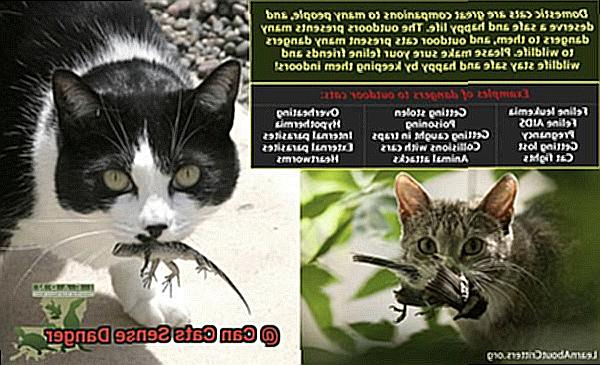Have you ever felt like your cat is more than just a furry companion? Many cat owners believe that their feline friends possess an otherworldly ability: the power to sense danger. Have you noticed your cat acting oddly, staring at something you can’t see, or hiding before anything alarming happens? These behaviors suggest that cats can perceive potential threats before humans do.
Scientific studies have shown that cats have exceptional senses that help them detect threatening situations. Their acute hearing allows them to pick up on sounds beyond human perception, and their night vision enables them to see in the dark. But can they sense things beyond their physical abilities?
Research reveals that cats can sense danger through intuition. Their survival instinct is honed to perfection, and their sensitivity to environmental changes enables them to pick up on subtle cues that humans often miss. They can detect changes in barometric pressure, vibrations, and even the electromagnetic fields in their surroundings.
So, it’s not just superstition – cats really can sense danger. These mysterious creatures possess an intuition that goes beyond conventional scientific understanding. In this post, we’ll explore the different ways cats react to and sense danger. Get ready for a fascinating journey into the world of feline premonition.
Cats’ Exceptional Hearing
Cats are exceptional creatures with a unique set of skills, and their ability to hear is no exception. Their hearing is so remarkable that it’s beyond human comprehension. So, what makes cats’ ears so incredible?
Well, firstly, cats can move their ears independently, which means they can locate the source of a sound with fantastic precision. This ability allows them to hear high-pitched sounds beyond the range of human hearing and ultrasonic sounds made by rodents and insects.
Cats’ acute sense of hearing makes them highly alert to any potential dangers in their surroundings. They can hear the slightest rustling of leaves or the softest footsteps, enabling them to detect the presence of predators or other threats quickly. Their ability to filter out background noise and focus on specific sounds also helps them sense danger more effectively.
In fact, if a cat hears something that they perceive as a potential threat, they will turn their head towards the sound and focus their attention on it. This allows them to determine whether the sound is something to be concerned about or not.
Cats’ exceptional hearing also makes them highly skilled hunters. They can hear their prey from far away and track its movements with incredible accuracy. This skill has been honed over thousands of years of evolution and has allowed cats to become one of the most efficient predators in the animal kingdom.
But cats don’t just rely on their hearing to protect themselves from harm. They have an acute sense of smell and excellent vision that helps them detect even the slightest changes in their environment. They also have a sixth sense or instinctual awareness that helps them detect danger even when there are no obvious signs.
As pet owners, it’s crucial to appreciate our feline friends’ incredible ability to sense danger and take steps to keep them safe. Simple things like securing doors and windows and avoiding loud noises can help prevent potential threats from entering our cats’ environment.

Cats’ Acute Sense of Smell
Cats are truly fascinating creatures, and their acute sense of smell is just one of the many things that make them unique. With about 200 million scent receptors in their noses, they surpass humans’ 5 million by a long shot. This means that cats can detect even the faintest of scents, making them highly skilled at detecting potential predators or prey.
But a cat’s sense of smell isn’t just limited to detecting food or danger. They can also pick up on pheromones, which are chemical signals released by other animals, including humans. These pheromones can help cats detect changes in the environment, such as a new pet or person in the home.

Cats also use their sense of smell to communicate with other cats. By rubbing their faces or spraying urine, they leave scent marks on objects or surfaces that contain information about their identity, territory, and reproductive status. Other cats can pick up on these scents and understand the message that the cat is trying to convey.
When it comes to danger, cats can sense changes in the environment through their sense of smell. They can detect smoke or gas in the air before humans do, allowing them to escape danger before it becomes too late. And if there’s a predator nearby like a dog or coyote, a cat’s nose is sharp enough to pick up its scent and take appropriate action to avoid being attacked.
As pet owners, it’s crucial to keep our feline friends safe by being aware of their acute sense of smell. This means keeping hazardous substances out of reach and providing plenty of opportunities for cats to explore and mark their territory.
Cats’ Excellent Vision
Cats are notorious for their sharp senses, and their exceptional vision is no exception. Their eyes are specifically designed to help them detect potential dangers and threats, making them highly sensitive to changes in their surroundings. In this article, we will dive deeper into how cats’ eyes are uniquely designed to help them sense danger and stay safe.
One of the most fascinating aspects of cats’ vision is their wider field of view. Unlike humans, cats can see more of their surroundings without having to move their heads. This means they can quickly detect movements or changes in their environment that may indicate potential threats or predators. With a quick glance, they can assess whether they need to flee or stay put.
Moreover, cats have a greater range of peripheral vision than humans. This allows them to detect movement from the side even when they are looking straight ahead. Imagine being able to see everything happening around you without having to turn your head. This heightened sense of awareness helps keep them safe and avoid dangerous situations.
Cats’ eyes are also designed to see in low light conditions. This is because of the reflective layer behind their retina called the tapetum lucidum. It helps them absorb more light and see more clearly in the dark. As a result, cats can easily navigate their way through dimly lit environments like dark alleys or moonlit backyards.
Furthermore, cats have pupils that can dilate much more than human pupils. This allows them to let in more light and see better in low-light conditions. Their eyes adjust quickly to changes in light, allowing them to adapt to different environments with ease.
Lastly, cats have a third eyelid called the nictitating membrane, which helps protect their eyes from damage and keep them moist. This unique feature is especially helpful for outdoor cats who may encounter dirt or debris while exploring their surroundings.
Cats’ Sixth Sense
This belief is not unfounded, as cats have been observed to display unusual behavior just before natural disasters or other dangerous situations occur.
One possible explanation for this behavior is that cats have a heightened sense of hearing and smell. It allows them to detect changes in their environment before humans can. For instance, cats can hear the sound of an earthquake before it reaches human ears or smell the smoke from a fire before it becomes visible. This heightened sense of detection enables cats to anticipate danger and take necessary action to stay safe.
Apart from their keen sense of hearing and smell, cats are highly attuned to their surroundings. They can pick up on subtle cues that humans may miss, like changes in atmospheric pressure or electromagnetic fields that indicate an impending storm. This heightened intuition enables them to prepare for any potential danger ahead of time.
As responsible pet owners, it is essential to pay attention to our cats’ behavior and take any unusual actions as a sign that something may be amiss. For example, if your cat suddenly becomes agitated or hides for no apparent reason, it could be a sign that a natural disaster is imminent. By being aware of these cues, we can help keep our feline friends safe and secure.
wAjvMHSr95w” >
How to Recognize When a Cat Is Sensing Danger
You love your furry friend and want to protect them from harm. Fortunately, cats have a natural ability to sense danger and react accordingly. But, how can you tell when your cat is sensing danger? Here are five ways to recognize when your cat is feeling threatened.

Changes in Behavior
Cats are creatures of habit and routine. If your typically calm and relaxed cat suddenly becomes anxious, agitated or starts hiding, it could be a sign that they are sensing danger. They may also refuse to eat, drink or play as usual.
Body Language
Pay attention to your cat’s body language. Cats are masters of non-verbal communication and will often puff up their fur, arch their backs, and flatten their ears when they feel threatened or scared. They may also hiss, growl or swish their tail to warn off any potential threats.
Heightened Senses
Cats have a heightened sense of smell and hearing, which means they may pick up on things that humans cannot. If your cat suddenly becomes alert and starts staring at something intently, it could be a sign that they have detected an unusual scent or sound. They may also start sniffing the air or twitching their ears.
Warning Signs

In some cases, cats may try to warn their owners of potential danger. For example, if your cat suddenly starts scratching at a door or window, it could be a sign that they are trying to alert you to something outside. They may also meow insistently or rub against you for comfort.
Individual Temperament
It’s important to note that while cats can sense danger, they may not always respond in the same way. Some cats may become aggressive and confront the perceived threat head-on, while others may try to escape or hide. As a cat owner, it’s important to understand your cat’s individual temperament and behavior patterns so that you can better anticipate how they may react in a potentially dangerous situation.
Also Read: Can Cats Sense Snakes?
Conclusion
To sum up, cats possess extraordinary abilities that help them detect potential dangers in their surroundings. Their sharp senses of hearing, vision, and smell allow them to pick up on subtle cues that humans may miss. Additionally, cats have an intuition or sixth sense that enables them to anticipate danger before it happens.
As responsible pet owners, it’s crucial to take steps to keep our feline friends safe from harm. Simple precautions such as securing doors and windows and avoiding loud noises can go a long way in preventing potential threats from entering our cats’ environment. It’s also important to pay attention to their behavior and body language as they may be trying to communicate a sense of danger.
Cats are enigmatic creatures that never cease to amaze us with their unique abilities. Their exceptional senses make them superb hunters and survivors in the wild, while also making for affectionate companions at home. By gaining insight into how cats perceive the world around them, we can deepen our appreciation for their intelligence and form stronger bonds with these captivating animals.







